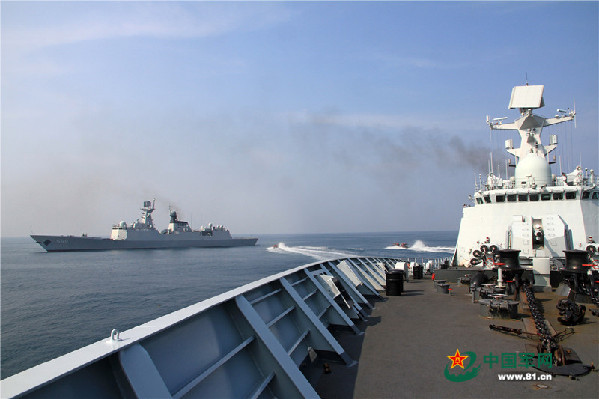Hidden China-US struggles under South China Sea lighthouse
- By Zhang Jingwei
 0 Comment(s)
0 Comment(s) Print
Print E-mail China.org.cn, October 30, 2015
E-mail China.org.cn, October 30, 2015
|
Soldiers ride in boats from a destroyer to conduct a visit, board, search and seizure training exercise aboard a simulated enemy vessel. Recently, a guided-missile destroyer flotilla under the South China Sea Fleet of the PLA Navy organized its warships to conduct a realistic confrontation training exercise, including such subjects as formation offense and defense, visit, board, search and seizure, anti-shore firing at night and anti-aircraft firing in complex electromagnetic environment.(Source: 81.cn) |
The South Sea and the South China Sea are different names for the same waters but reflect how China's claim is different from that of southeastern Asian countries as well as the United States.
If the sovereignty disputes over the South China Sea islands between China and its southeastern Asian neighbors could be referred to as the first stage of contention, then reclamation over reefs in the waters conducted by China, Vietnam and the Philippines will bring the struggle into the second stage. In the struggles over the islands, the United States' increasing involvement represents China's main opposition on this issue.
But Washington's stance is self-contradictory. On one hand, the United States needs to back up southeastern Asian countries to maintain its presence in Asia and to strategically rebalance the Asia-Pacific region. On the other hand, the United States has stressed it would assume an impartial stance, acknowledge that all parties in the islands struggle are conducting reclamation and they are responsible for solving the problem. U.S. President Barack Obama reiterated this position during Chinese President Xi Jinping's latest U.S. visit.
The United States has varied its stance due to such contradictions, and thinks it has to contain China's progress in the South China Sea to maintain its leadership in the Asia-Pacific Region.
Recently, China put two lighthouses, respectively on Huayang Reef and Chigua Reef, both among the Nansha Islands, into operation. The Philippines and some other neighboring countries have aired their dissatisfactions. However, just as China's Ministry of Foreign Affairs has pointed out, the lighthouses are civilian facilities which safeguard navigation, and impose no harm to the navigation freedoms bolstered by the United States.
Observers believe that the United States is embarrassed because once its vessels use the facilities, it will mean that Washington has acknowledged China's sovereignty concerning these reefs. Hence, the United States has said its ships would cruise within the 12 nautical mile-range of the reefs, meaning that Washington does not support China's sovereignty claim.
All signs show that the struggles between China and the United States are being intensified as the two sides have at least started a fierce war of words. However, this contention hardly has an end, nor a winner.




Go to Forum >>0 Comment(s)